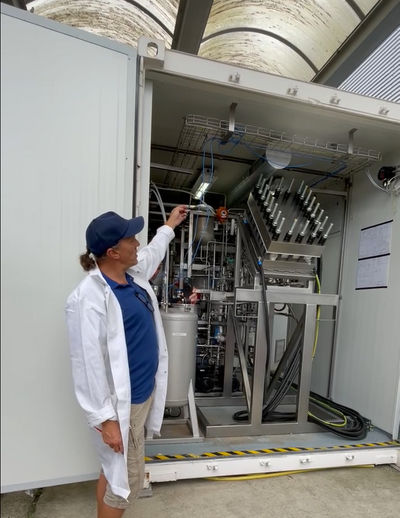New Electrolyzer to Turn Emissions into e-Fuels
An EU-funded project is helping accelerate the adoption of carbon capture and utilisation (CCU) technologies that transform carbon dioxide emissions into valuable resources such as fuels, chemicals, and construction materials.
CCU is based on the principle of capturing carbon dioxide and reusing it in various forms, such as e-fuels created by combining captured CO2 with renewable hydrogen.
The ECO2Fuel project is pioneering this approach by developing a 1MW low-temperature electrolyzer capable of converting captured CO2 directly into sustainable liquid fuels using renewable electricity and water.
By demonstrating this technology at industrial scale, the project aims to make e-fuels a viable solution for decarbonizing Europe’s most polluting sectors.
Last year, the project developed a 50kW stack within the ECO2Fuel electrolyzer system. The electrolyzer system can work at elevated pressures, has a continuous gas monitoring system and the ability to recycle the cathodic gas mixture in order to increase the conversion of CO2.
Scaling up the system to 1MW is a key objective of the project, with the aim of testing it by 2026. This necessitated a cell design of 1,500 cm² exceeding most currently-used pressurized CO2 electrolysis stacks. The 50kW stack uses 25 cells of 1,500cm² to create a total area of 3.75m². The 1,500cm² cell equals the current state-of-the-art in PEM (proton exchange membrane) water electrolysis.
Several scaling challenges have already been overcome, including as sealing of the stack at higher pressures, gas- and liquid flow management and structural integrity of the stack components.
The project brings together a coalition of leading businesses and research institutions: Deutsches Zentrum für Luft-und Raumfahrt e.V. (DLR), RWE, Bekaert, De Nora, HyGear, ARIEMA, Energía y Medioambiente S.L., Monolithos Ltd., HYDROLITE, Think11, META Group, CENTRO RICERCHE FIAT SCPA, DTU – Technical University of Denmark, Universitat Politècnica de València (UPV), Consiglio Nazionale delle Ricerche (CNR), and VITO.
RWE, in charge of site-demonstration testing in the ECO2Fuel project, has already successfully demonstrated a new method of generating back-up power using e-fuels. The company used a stationary engine with an electric output of 200kW. The exhaust gases produced by this engine are sent back to a carbon capture plant which uses a chemical process with amines (compounds often used to remove CO2) to capture carbon dioxide. This plant captures 7.2 tonnes of CO2 per day, at a capture rate of 90% of the CO2 from the exhaust gases.
In a recent testing campaign, a capture rate of 99.8% was achieved, resulting in a lower CO2 concentration in the off-gas from the carbon capture plant than in the atmosphere.
The captured CO2 is then used as a raw material for the ECO2Fuel demonstrator, which will have a capacity of 1MW and produces carbon-based e-fuels. These e-fuels can be reused in the engine, creating a cycle that recycles the carbon rather than releasing it into the atmosphere, thus “closing the carbon loop”.
In each cycle fossil carbon is replaced by recycled carbon and emissions from fossil feedstock are avoided. Additionally, the high-temperature exhaust gas from the engine is being studied for its potential to be reused for heating and improving overall energy efficiency.
The experts specifically looked at the effects of increased oxygen and nitrogen oxides (NOx) in the exhaust gas on the performance of the CO2 capture plant, including the energy needed to regenerate the solvent, emissions, and solvent degradation. To do this, RWE Power has performed testing campaigns in its operational infrastructure at the Innovation Centre at Niederaussem (North Rhine-Westphalia, Germany).
In a recent conversation with ECO2Fuel, Tudy Bernier, Policy Director at CO₂ Value Europe, underlined the strategic role CCU can play in the European Green Deal: “CCU will not be the only solution we need, but it will absolutely be one of them, especially for hard-to-abate sectors like aviation, shipping, and heavy industry,” he said. “These are areas where electrification is either technically complex or economically unviable in the short term, and where drop-in CCU fuels can oer a more realistic alternative to fossil-based options.”















